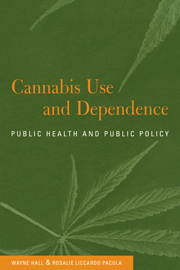Book contents
- Frontmatter
- Dedication
- Contents
- List of figures and tables
- Foreword
- Acknowledgements
- 1 Introduction
- Section 1 Cannabis the drug and how it is used
- Section 2 The health effects of cannabis
- Section 3 The psychological effects of chronic cannabis use
- Section 4 Effects on adolescent development
- Section 5 Harms and benefits of cannabis use
- Section 6 The effectiveness and costs of cannabis prohibition
- Section 7 Policy alternatives
- Appendix 1
- Appendix 2
- References
- Index
1 - Introduction
Published online by Cambridge University Press: 05 July 2016
- Frontmatter
- Dedication
- Contents
- List of figures and tables
- Foreword
- Acknowledgements
- 1 Introduction
- Section 1 Cannabis the drug and how it is used
- Section 2 The health effects of cannabis
- Section 3 The psychological effects of chronic cannabis use
- Section 4 Effects on adolescent development
- Section 5 Harms and benefits of cannabis use
- Section 6 The effectiveness and costs of cannabis prohibition
- Section 7 Policy alternatives
- Appendix 1
- Appendix 2
- References
- Index
Summary
For over thirty years there has been a recurrent debate in Australia (Senate Standing Committee on Social Welfare, 1977), Canada (Canadian Government Commission of Inquiry, 1970), the United Kingdom (Advisory Committee on Drug Dependence, 1968), and the USA (National Commission on Marihuana and Drug Abuse, 1972) about whether these societies should continue to prohibit the use of cannabis by adults. Cannabis prohibition was introduced in these countries before cannabis use became common among young adults (McAllister and Makkai, 1991; Manderson, 1993) in the late 1930s in the USA and in the early 1960s in countries that signed the UN Single Convention on Narcotic Drugs (1961) which classified cannabis as a narcotic drug with cocaine and heroin (McAllister, 2000).
The debate about the legal status of cannabis in the late 1960s and early 1970s was prompted by the fact that many young people in the US and UK were ignoring the prohibition on cannabis use. The seeming failure of criminal law to deter cannabis use, and the increasing number of young adults who appeared before the courts for using cannabis, prompted calls to repeal or reform cannabis prohibition (e.g. Advisory Committee on Drug Dependence, 1968; Kaplan, 1970; National Commission on Marihuana and Drug Abuse, 1972).
The most popular proposal has been ‘decriminalisation’: removing criminal penalties for cannabis use while maintaining prohibition. Decriminalisation has been opposed by those who believe that cannabis has serious adverse effects on the health of users and on societies which tolerate its use (e.g. Nahas and Latour, 1992). Proponents of cannabis liberalisation (e.g. Grinspoon and Bakalar, 1993; Zimmer and Morgan, 1997) argue that the major harms arising from cannabis use are consequences of the fact that its use is illegal (such as, fear of arrest, a blackmarket, and the adverse effects on reputation of a criminal conviction) rather than consequences of its use.
- Type
- Chapter
- Information
- Cannabis Use and DependencePublic Health and Public Policy, pp. 1 - 10Publisher: Cambridge University PressPrint publication year: 2002



